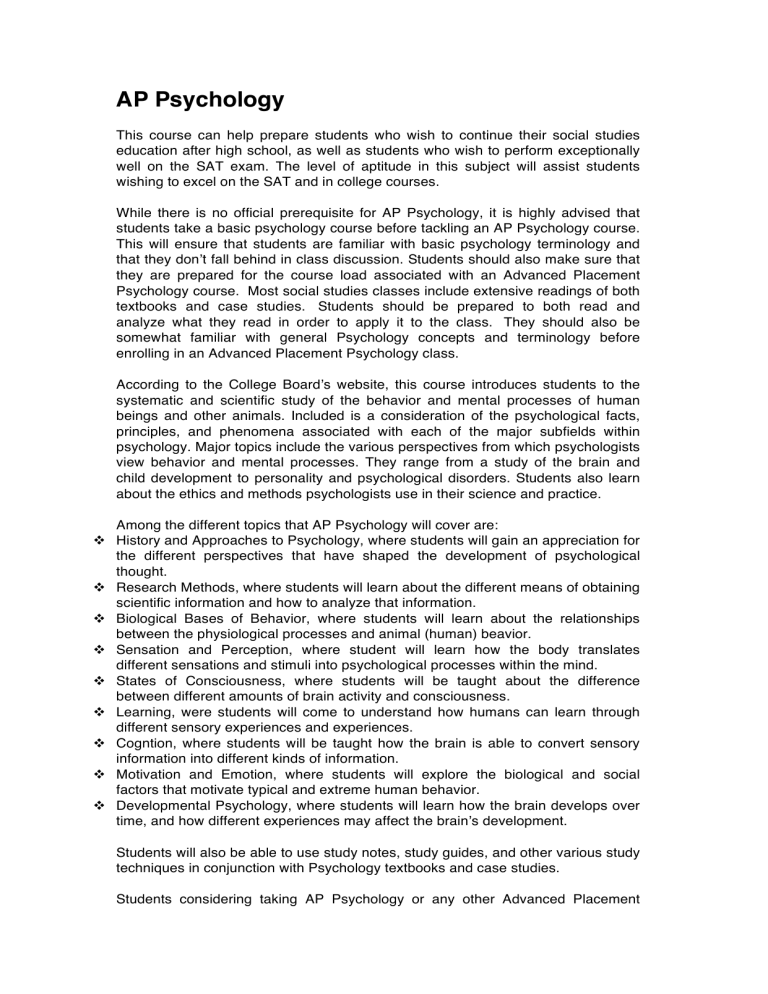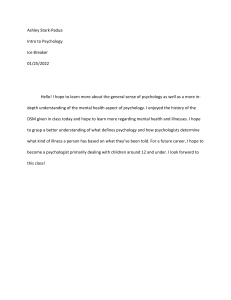
AP Psychology This course can help prepare students who wish to continue their social studies education after high school, as well as students who wish to perform exceptionally well on the SAT exam. The level of aptitude in this subject will assist students wishing to excel on the SAT and in college courses. While there is no official prerequisite for AP Psychology, it is highly advised that students take a basic psychology course before tackling an AP Psychology course. This will ensure that students are familiar with basic psychology terminology and that they don’t fall behind in class discussion. Students should also make sure that they are prepared for the course load associated with an Advanced Placement Psychology course. Most social studies classes include extensive readings of both textbooks and case studies. Students should be prepared to both read and analyze what they read in order to apply it to the class. They should also be somewhat familiar with general Psychology concepts and terminology before enrolling in an Advanced Placement Psychology class. According to the College Board’s website, this course introduces students to the systematic and scientific study of the behavior and mental processes of human beings and other animals. Included is a consideration of the psychological facts, principles, and phenomena associated with each of the major subfields within psychology. Major topics include the various perspectives from which psychologists view behavior and mental processes. They range from a study of the brain and child development to personality and psychological disorders. Students also learn about the ethics and methods psychologists use in their science and practice. Among the different topics that AP Psychology will cover are: v History and Approaches to Psychology, where students will gain an appreciation for the different perspectives that have shaped the development of psychological thought. v Research Methods, where students will learn about the different means of obtaining scientific information and how to analyze that information. v Biological Bases of Behavior, where students will learn about the relationships between the physiological processes and animal (human) beavior. v Sensation and Perception, where student will learn how the body translates different sensations and stimuli into psychological processes within the mind. v States of Consciousness, where students will be taught about the difference between different amounts of brain activity and consciousness. v Learning, were students will come to understand how humans can learn through different sensory experiences and experiences. v Cogntion, where students will be taught how the brain is able to convert sensory information into different kinds of information. v Motivation and Emotion, where students will explore the biological and social factors that motivate typical and extreme human behavior. v Developmental Psychology, where students will learn how the brain develops over time, and how different experiences may affect the brain’s development. Students will also be able to use study notes, study guides, and other various study techniques in conjunction with Psychology textbooks and case studies. Students considering taking AP Psychology or any other Advanced Placement course should recognize that taking these classes requires a more serious commitment than other high school courses. Students that commit themselves to their coursework will see a substantial payoff in both their SAT exam scores as well as their college preparedness. Students that wish to get accepted into prestigious or highly-selective schools should seriously consider taking AP courses. They not only look outstanding on high school transcripts, but they can also give students an inside look at college courses before graduating from high school. Most importantly, they can assist students in earning college credit while still in high school, saving valuable time and money in the process. They will also help students develop the skills they need to succeed in the rigorous college atmosphere, and give students valuable knowledge that they can use both inside and outside of the classroom. The sooner students get a jump on their education, the sooner they’ll be able to reap the benefits of their efforts!




